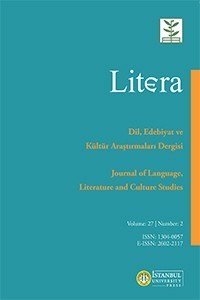Memorable Houses and Distorted Realities: Reading of the House in Historiographic Context in Kazuo Ishiguro’s The Remains of the Day & John Banville’s The Sea
Memorable Houses and Distorted Realities: Reading of the House in Historiographic Context in Kazuo Ishiguro’s The Remains of the Day & John Banville’s The Sea
This study aims to present an analysis of the house theme in the historiographic context of Kazuo Ishiguro’s The Remains of the Day and John Banville’s The Sea. From the eighteenth century to the present, the concept of the house has appeared as a prominent image in the British novel by referring to different aspects of the British lifestyle and social conditions, both in public and private terms. As critics argue, English estates and country houses represent a wider meaning than simply being vast and remarkable residences of the aristocracy. Considering the contemporary depictions of the house, one can see how it reflects the problematic link between the past and the present, as can be examined in Kazuo Ishiguro’s The Remains of the Day and John Banville’s The Sea. Both novels present middle-aged, nostalgic protagonists who seek meaning in the contrast of their memories and present conditions. In problematic personal quests between past and present, the image of the house plays an important role, materialising the link between the old and the new. Thus, the country house, as in former examples, is re-interpreted in contemporary novels in a historiographic context. Considering the historiographic structure and the symbolism reflected by the concept of the house in The Remains of the Day and The Sea, this paper aims to present how history, both on official and personal levels, is re-interpreted in a historiographic context by centering on the personal quest of the protagonists and their relationship to the house.
___
- Atilla, A. (2008). Historiography and the English Novel (1980-90). İzmir: Ege University Press. google scholar
- Avcı-Öztabak, E. (2016). ‘You Never Know Who You’re Addressing’: A Study of the Inscribed ‘You’ in The Remains of the Day”. Kazuo Ishiguro in a Global Context, 49-57. London: Routledge. google scholar
- Banville, J. (2005). The Sea. London: Picador. google scholar
- Bentley, N. (2008). Contemporary British Fiction. Edinburgh: Edinburgh University Press. google scholar
- Facchinello, M. (2010). “The Old Illusion of Belonging”: Distinctive Style, Bad Faith and John Banville’s The Sea”. Estudios Irlandeses, 5, 33-44. google scholar
- Fotyga-Terentowicz, U. (2015). Dreams, Nightmares and Empty Signifiers: The English Country House in the Contemporary Novel Vol. 7. Peter Lang. google scholar
- Hutcheon, L. (1988). A Poetics of Postmodernism: History, Theory, Fiction. London: Routledge. google scholar
- Ishiguro, K. (1989). The Remains of the Day. London: Faber and Faber. google scholar
- Kucala, B. (2016). “Memory and the Splitting of the Self in John Banville’s The Sea”. Lublin Studies in Modern Languages and Literature, 40, 10-23. google scholar
- Lyotard, J. F. (1984). The Postmodern Condition: A Report on Knowledge. Vol.10, Minnesota: University of Minnesota Press. google scholar
- McHale, B.(1987). Postmodernist Fiction. New York: Methuen & Co. google scholar
- Moreno, M.C. (2015). “Returning Home versus Movement without Return: A Levinasian Reading of John Banville’s The Sea”. AEDEAN, 37, 51-68. google scholar
- Murphy, N. (2018). Contemporary Irish Writers: John Banville. London: Bucknell University Press. google scholar
- Nicol, B. (2009). The Cambridge Introduction to Postmodern Fiction. Cambridge: Cambridge University Press. google scholar
- O’Connell, M. (2013). John Banville’s Narcissistic Fictions. London: Palgrave Macmillan. google scholar
- Parkes, A. (2001). Kazuo Ishiguro’s The Remains of the Day: A Reader’s Guide. New York: The Continuum Contemporaries. google scholar
- Su, J.J. (2002). “Refiguring National Character: The Remains of the British Estate Novel”. Modern Fiction Studies, 48, 552-580. google scholar
- Teo, Y. (2014). Kazuo Ishiguro and Memory. London: Palgrave Macmillan. google scholar
- Watkiss, J. (2007). “Ghosts in the Head: Mourning, Memory and Derridean ‘Trace’ in John Banville’s The Sea”. The Irish Journal of Gothic and Horror Studies, 2, 55-71. google scholar
- Wesseling, E. (1991). Writing History as Prophet: Postmodernist Innovations of the Historical Novel. Amsterdam / Philadelphia: J. Benjamins Publishing. google scholar
- Westerman. M. (2004). “Is the Butler Home? Narrative and the Split Subject in The Remains of the Day”. Mosaic: An Interdisciplinary Critical Journal, 37, 157-170. google scholar
- Başlangıç: 1954
- Yayıncı: İstanbul Üniversitesi
Sayıdaki Diğer Makaleler
Max Aub, a Body in Transit in a Lost Time: Reflections and Thoughts on Exile in His Works
E. M. Forster’ın “Makine Duruyor” Öyküsünde Teknososyal Bireyler ve ‘Prometheusçu Utanç’
A Micrology of Pattern Recognition in Philip K. Dick’s A Scanner Darkly
Collecting and Destroying Postcards: Discursive Travel in Lynne Tillman’s Motion Sickness
Tracing Gender in The Rock of Tanios in the Context of Feminist Literary Criticism
Deconstructive Critique of the Story «Cirios Rojos» by Segundo Serrano Poncela
Orpheus and Eurydice Revisited: Grief and Grieving in Zinnie Harris’ Meet Me at Dawn
